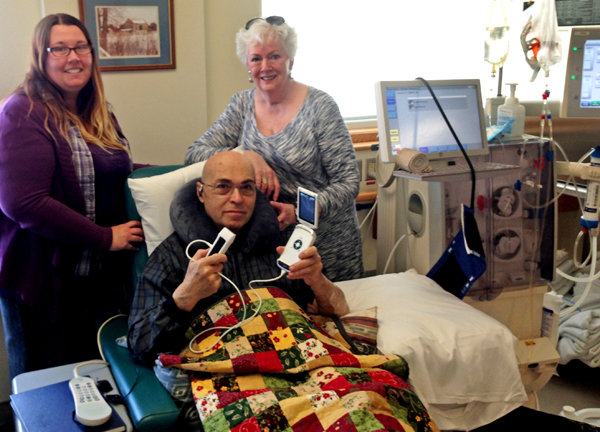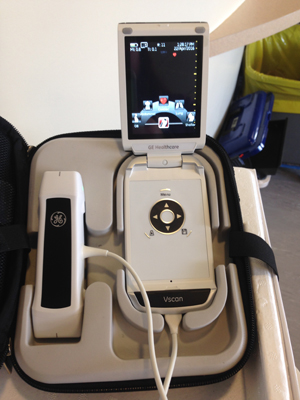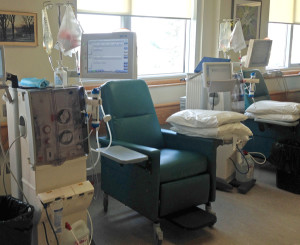Community supports dialysis; missing treatments is not an option
Administrator | Apr 26, 2016 | Comments 0

Peter Sheridan, a dialysis patient, is pictured in the MacSteven Dialysis Clinic with the portable ultrasound machine. With him are Briar Boyce, communications co-ordinator with the PECMH Foundation and Lillian Duffy, Foundation board member.
The generosity of the County community excells once again, but this time for the MacSteven Dialysis Clinic located in the Prince Edward County Memorial Hospital.
Recently the hospital foundation, through donations directed to the Dialysis Clinic, helped offset the cost of a handheld ultrasound machine with a gift of $7,210.
The contributions were primarily received through the In Memoriam program through which donors make gifts in memory of deceased friends and family.
 “This pocket-sized ultrasound device enables the nurses to easily take an image of a patient’s blood vessels from the comfort of their dialysis chair,” said said Lillian Duffy, Foundation Director and champion for the Dialysis Clinic. “The hemodialysis service in Picton requires ultrasound as part of the needling process for any new or ‘difficult-to-needle’ fistulas and grafts as part of the process to connect a dialysis patient to the dialysis machine.”
“This pocket-sized ultrasound device enables the nurses to easily take an image of a patient’s blood vessels from the comfort of their dialysis chair,” said said Lillian Duffy, Foundation Director and champion for the Dialysis Clinic. “The hemodialysis service in Picton requires ultrasound as part of the needling process for any new or ‘difficult-to-needle’ fistulas and grafts as part of the process to connect a dialysis patient to the dialysis machine.”
Duffy, whose husband Mike receives dialysis in Picton, says having this new equipment will play a vital role in decreasing the number of injuries to blood vessels that can happen when a patient is connected to the dialysis machine.
“We thank our many generous donors who support the Dialysis Clinic through our In Memoriam program and especially thank those who designate the Foundation as a recipient of gifts in memory of a loved one,” she said. “These gifts are of immense and continuing benefit to the patients and staff at PECMH and assists with ongoing equipment needs for our County Hospital.”
Peter Sheridan, of Milford, has been receiving dialysis for five years, most recently in Picton. The former professor, who taught the history of philosophy and science technology principally at the University of Montreal, credits nurses, doctors and the hospital system for saving his life. Noting bias toward the nurses working in the Picton unit, he believes they are true heroes.
With help from the staff in the Dialysis Clinic, he prepared a testimonial (see below) of what undergoing dialysis entails.
Hemodialysis, also called dialysis, is the most common treatment for kidney failure. A dialysis machine is an artificial kidney which cleanses the blood. During dialysis, blood is drawn from the patient into the dialysis machine, circulated through the machine, and then returned to the patient. Hemodialysis is normally performed three times a week.
The great majority of accesses are created in the arm, but they can also be created in the leg. The portable ultrasound will make it easier for these blood vessels to be located and catheters inserted with less risk of injury.
The MacSteven Dialysis Clinic officially opened on September 9, 2002. It is a satellite program offered by the Kingston General Hospital. Patients receive treatment three times a week, for three to five hours.
Missing a treatment is not an option.
Dialysis in Picton: A personal testimonial
By Peter Sheridan
A few months ago, several dialysis chairs became available in Picton. That news was welcomed by my wife and I and by other patients and families who no longer needed to drive six or more hours weekly from the County to Kingston General Hospital (KGH) three times a week for dialysis. There are others who, as yet, are not so fortunate.
To put it in perspective, the MacSteven Dialysis Clinic located in the Prince Edward County Memorial Hospital welcome 11 patients for four hours of dialysis on Monday, Wednesday and Friday mornings since 2002 and another 11 patients for four hours in the afternoon, year round. It is open for 12 hours, from 7a.m. to 7p.m., on each of the days. This includes preparation, patient care, clean up, report writing and many other professional activities by the staff.
Picton is one of several satellite clinics of KGH. There are others, for example, at Perth and Smith Falls and at Bancroft. Three nurses are on duty here at any one time, with the much appreciated assistance of other equally kind and highly knowledgeable support staff in their fields of expertise.
The PEC Memorial Hospital Auxiliary volunteers who perform numerous functions are greatly appreciated as well. Indeed, the experience of dialysis has afforded me the opportunity to get to know and understand many new people – both caregivers and fellow patients – whom I otherwise may never have met.
 From where I sit, immobilized for four hours, while hooked up by catheter to a dialyzer and a blood pressure cuff, I am most appreciative for being covered with a heated blanket or donated handmade quilt, and for the water, ice chips, ginger ale or hot tea and toasted English muffins. We patients are spoiled silly, and I feel nothing but deep gratitude.
From where I sit, immobilized for four hours, while hooked up by catheter to a dialyzer and a blood pressure cuff, I am most appreciative for being covered with a heated blanket or donated handmade quilt, and for the water, ice chips, ginger ale or hot tea and toasted English muffins. We patients are spoiled silly, and I feel nothing but deep gratitude.
Dialysis itself permits us to extend our lives, of which we are aware and thankful every day. I am most thankful for our nurses’ lifesaving compassionate professionalism and skilled team work especially in the event of crisis, such as when blood pressure tanks or spikes, or when muscle spasms set in.
In addition to these caregivers, there are occasional nephrologists and dietician visits which review and fine tune our medical orders and nutritional advice according to the evolving needs of each patient.
As a patient, I could not help but become quickly aware of the cost. The first thing that struck me was the high capital cost of the complex, computerized dialysis machines that keep kidney-failure patients alive. I think of them as specialized electronic washing machines with added filters and computer monitor screens and other modifications. They use a lot of water, electricity, tubing, filters and other replaceable materials. The materials help clean toxins like creatinine and uric acid in the blood. They also help rebalance electrolytes and hormones as needed by each individual patient. Most importantly, they help to reduce fluid buildup and regulate blood pressure.
As well, there are many behind-the-scenes costs, such as leasing arrangements between institutions, salaries of various professionals and unseen technicians who transport and fix machines when they break down, and other costs such as hardware, software, supplies and diverse service and assets that I can’t even imagine.
How do I occupy my time during dialysis? Sometimes I catch 40 winks! At other times, I read a journal article on a Giller prize publication from our great library, or attempt to do a crossword puzzle or Sudoku. Mostly through headphones, I listen to radio and occasionally I watch television. Then there are times when I meditate on life and the many lessons of my disease.
I have a sense of profound gratitude for the highest level of professional care and I know both the effort and expense required. I’m aware that many patients in other countries do not have such easy access to dialysis, if at all.
I am deeply thankful for dialysis in this country, this province and right here at PECMH.
Filed Under: Featured Articles • Local Services
About the Author:
































